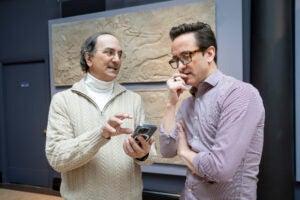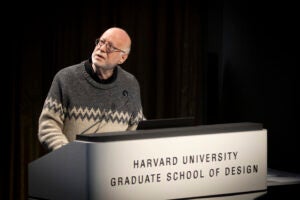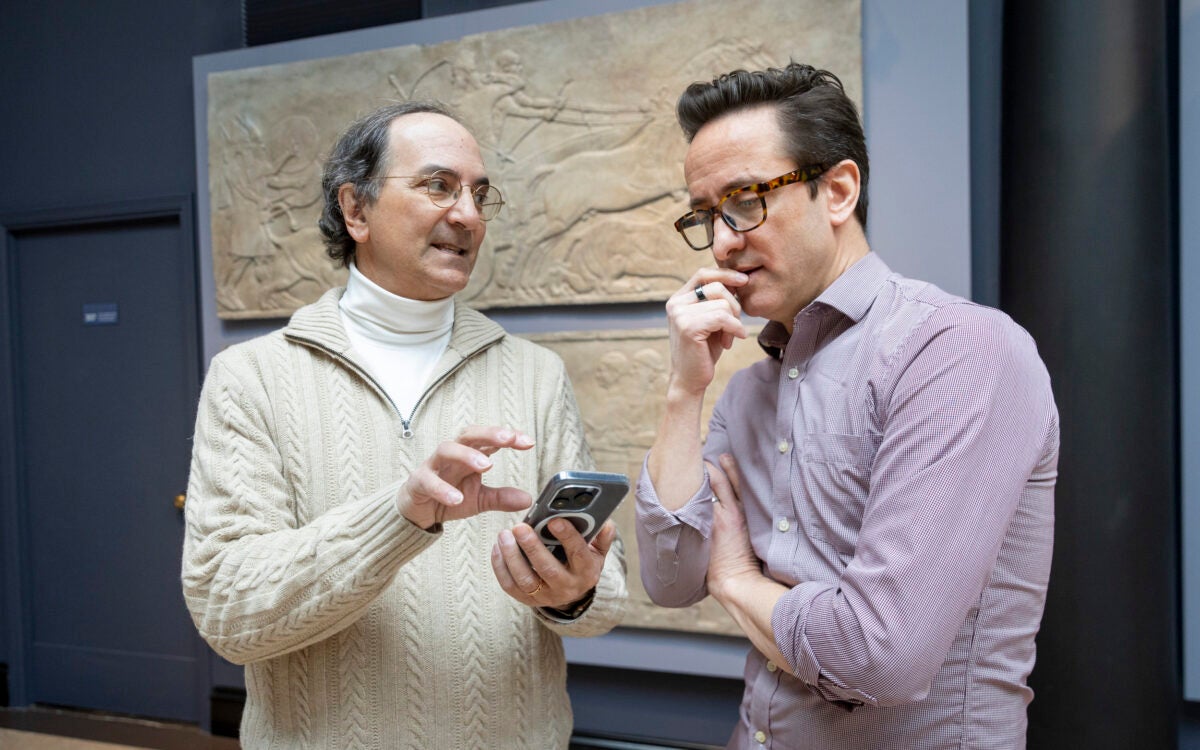Friendly wave hits Asia
The cultural ‘Korean wave’ is analyzed, enjoyed at the Kennedy School
Six years after sweeping across Asia, the Korean wave hit Cambridge with a crash on Friday (Feb. 16) during a panel at Harvard’s Kennedy School of Government.
“Korean wave” – or Hallyu – refers to the sizzling popularity of South Korean popular culture throughout Asia. From the Philippines and Malaysia, to Singapore, Japan, and China, prosperous and democratic South Korea is a benchmark of the hip – in television dramas, movies, pop music, clothes, electronics, and even hairdos.
Hallyu and its impact were not obvious to at least some of the 250 listeners that crowded into the Belfer Building’s Harry Starr Auditorium. The panel was co-sponsored by the Harvard Korea Institute and the Reischauer Institute of Japanese Studies.
“Some of you may know, but others have no idea,” said Jung-Sook Park, a one-time Korean broadcast journalist and actress, and now a Columbia University graduate student. In a sober and organized PowerPoint disquisition, she outlined Hallyu’s consumerist, nonpolitical “organic power,” linking Asian cultures still wary and divided after a century of wars.
But most of those in the largely Asian audience were definitely clued into Hallyu, and turned the early minutes of the panel into a mini-rock concert, lit by flashing digital cameras and the click of cell phone cameras.
The objects of adulation were likely not the four self-described balding white male Korea experts on the panel, or the panel’s lone female academic, who said she was a little starstruck herself, just to be on stage with Jung-Sook Park.
The panel’s glitz came from the glamorous and serene Ms. Park, who was once the Katie Couric of Korean television. And it came from her male counterpart on the panel – Jin-Young Park, a one-time hot pop singer in Korea who in 2004 moved his hip-hop music producing talents to the United States, as CEO of JYP Entertainment. By April, the man who calls himself J.Y. Park will open America’s first Asian record label, with offices in Manhattan.
With an open shirt and tousled dark hair, Mr. Park leapt to the microphone for his remarks, starting with a glam, fast PowerPoint on his rise through Korean pop culture and his leap across the Pacific.
“I picked the toughest country in the world” to move up in the music business, said Mr. Park, who has already produced some Billboard hits, including a number for Will Smith, “I Wish I Made That/Swagga.” In Korea, he started in 1993 as a dancer (“I still got the moves,” he said) and went on to have six chart-topping albums as a singer and 18 as a producer.
In the West, said Mr. Park, Asian culture is catching on – movies, TV animation, even sports stars. Everything but music, that is. So the United States “is the next stop for Hallyu.”
And it’s here that Hallyu should shed its name, and its exclusive Korea-ness – to simply become an Asian style with international artistic appeal, he said. “It’s about cultural sharing, not about Korea.”
Both Parks held out hope that Hallyu, whatever its fate, will have some effect on international political affairs – a bottom-up calming of the political waters on behalf of a democracy of pop consumers who just want to give peace a chance.
“I know where my hope lies,” said Ms. Park, who went on to answer questions from the audience in Korean. She called Hallyu “an instrument of peace” that has already calmed South Korea’s old enmities with Japan, Vietnam, China, and North Korea. In the isolated North Korean regime, she said, pirated Hallyu DVDs are a window onto trendy hair and clothing, and dramatize the idyll of political equality and placid consumerism.
Does Hallyu have geopolitical benefits? Some of the academics on the panel thought so. Others had hope, with reservations.
Poet and translator David R. McCann, director of the Harvard Korea Institute and Korea Foundation Professor of Korean Literature, said Hallyu shows that Asia is returning to a pattern of historical relations. Through the centuries, peaceful trade and culture-sharing were the norm, he said. McCann called the 20th century’s wars of imperialist aggression in Asia an “aberration,” and Hallyu “a return to human nature.”
Eileen Chow, assistant professor of Chinese literary and cultural studies in Harvard’s Department of East Asian Languages and Civilizations, was taken with the idea of Hallyu’s transformational “organic power” that transcends cultures, calming a pan-Asian distrust spawned by 20th century wars.
“It gets us out of civilizational discourse,” she said, and maybe to a place where everyone loves “My Sassy Girlfriend.” (In a review of the 2001 cult romantic comedy Chow used as a Hallyu model, one Internet fan wrote, “The last scene. Control those tears of JOY!”)
Hallyu is the latest cultural sign that audiences are becoming transnational. (“Cool Japan” is another, where 60 percent of the world’s animated cartoons are made and where Pokémon has wowed kids in 65 countries.)
“We need a more complex view of who we are than traditional international relations gives us … [one that] doesn’t fall into simple ideas of a nation,” said cultural anthropologist Ian Condry, the author of “Hip Hop Japan” and an associate professor of Japanese cultural studies at the Massachusetts Institute of Technology.
But as for a sign that Hallyu directly affects national governments, he said, “We’re not going to find it.”
Political scientist David Leheny, an associate professor at the University of Wisconsin, Madison, said if nothing else, the panel on Hallyu will teach a roomful of young Asians “what male-pattern baldness looks like from above” – a joking leitmotif picked up by all the male panelists, except the hirsute Mr. Park.
But the panel will also show that Hallyu is a form of “soft power” that has at least softened relations between Japan and Korea, whose political and racial enmity goes back centuries. “Hallyu didn’t create this debate” between the two nations, said Leheny. “It entered it – and changed it for the better.”
At the very least, the Kennedy School gathering will inspire new scholarship and a few needed doctoral dissertations, said moderator Carter J. Eckert, Yoon Se Young Professor of Korean History at Harvard.
He added, “This is the coolest panel I’ve ever been on.”




